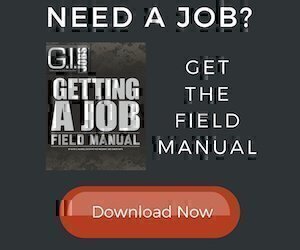According to reported statistics by Defense Manpower Data Center (DMDC), 7.3 percent of all living Americans have served in the U.S. military. Given that figure, it would seem that we vets are in high demand. There aren’t a lot of us, and we have some great, exclusive experience. But does this all mean we can walk out and get the job just for being a veteran?
Short answer: No.
Long short answer: Maybe. It’s as complicated as your Facebook status.
According to Forbes magazine, veterans have fluid abilities to both work with established procedures and changing environments. We also bring with us great leadership skills. Yet, with all this fabulous experience, veterans still face several challenges in the workplace, or getting hired at all. There are a series of stigmas and self-limiting factors that affect veterans when we apply for jobs.
- Inability to Translate Military Experience Into Civilian Needs
Many veterans have difficulty with this. Many of us have no idea how to say “head or latrine” in civilian, let alone corporate lingo. The trick here is to figure out what the civilian calls LPO, first shirt and work party. What does all that experience mean to a civilian employer? Management, supervision, initiative and organizational abilities, for example.
- Social Stigmas Over PTSD and Wartime Experience
This isn’t isolated to the Vietnam War. As a nation we’ve managed to change the tone of those returning from wartime deployments, but some of the old stigmas are still around. The truth is, some vets are returning home with things like PTSD, which remains terribly misunderstood. Heck, most of us don’t even understand it. But many more veterans return without it, and that goes unreported.
- Flooding of Potential Employees/Applications
How can employers even see veteran experience as valuable when they are flooded with applicants? How can anyone stick out in this situation? The truth is, many jobs are part of networking, meaning successful networkers get their resume looked at. It doesn’t mean they get the job, but it means they at least were considered for half a moment. So you’ve been deployed for the last five years, out to sea, serving overseas and now moved your experienced self somewhere you don’t know a soul? Yeah, we’ve got some challenges. The list below shows some of our best military-to-civilian resume content.
- Spring Cleaning Means Time to Clean Up Your Resume
- 10 Ways to Civilianize Your Resume
- 4 Ways to Make Your Military To Civilian Cover Letter Irresistible
- Your Resume: What a Potential Employer Sees
So there, we have some stuff to overcome. But if we successfully surpass these, we are hot tickets for an employer. We have some skill sets that are complete wins for any company.
No, I’m not talking about the urinal cleaning. Nope, not your skill with nautical knots either. Yes, I know you were special qualified in Information Equipment Specialization Marksmen Troubadour, but not that.
I’m talking about all the stuff you did to do this stuff. Believe it or not, you learned real valuable skills while washing that urinal.
So the jobs military personnel perform are as diverse as the civilian population and can vary further between service branch. Here are a few examples of how you can translate your military experience on your civilian resume.
1. Teamwork
No one knows how to integrate into a team more than military members. We understand how to fall into an organized and goal-focused group better than anyone. We understand that working together does not threaten our individuality but rather greases the wheels of accomplishment.
2. Structure
We know structure like the back of our hand, and it probably irritates us all a little bit. Yet we understand both its effectiveness and limitations and, quite frankly, how to work within the limits of the system for the best outcome.
3. Flexibility
As much as we understand structure, we also understand that flexibility is an important attribute. From shipping off to boot camp, deployments and transferring to new commands, we have learned how to personally adapt to a variety of circumstances.
Yes, your military experience helps you get hired, but it isn’t a sure thing. The competition remains difficult and veterans need to harness their skills and experience in order to keep up. Know the challenges, showcase your abilities and overcome.
Click on the image below and we will send you our Getting A Job Field Manual, which will help you plan out your military-to-civilian transition.








